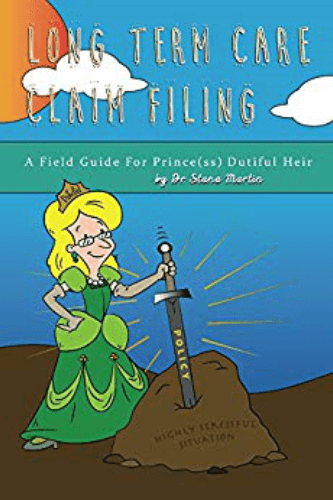Mrs. LTC can help you with this important decision. See here for the Top 10 Insider Tips for buying Long Term Care Insurance.
#1: DON’T OVERBUY:
One of the biggest fears people have when considering long term care insurance is how expensive it can be. We would be the first to agree that this is not the cheapest line of insurance you can own. But it is cheaper than paying this cost completely out of pocket. We recommend you work with a specialist who can tailor the policy to fit your needs so you buy just what you need and not one penny more.
A general rule of thumb would be that the premium should be either: (1) less than 7% of your retirement income OR (2) less than 2% of your total net worth.
#2 BE SURE TO SHOP:
Pricing can vary dramatically when you shift from one carrier to another. There are lots of reasons why this is so and we haven't room here to list them all.
The main thing to know is that you are generally better off if you shop around. Work with a broker (or more than one broker) so you can get a good feel of the price ranges available in your state. Working with more than one broker will also get you a second opinion about how best to solve the issue. You may find that you agree with one person’s approach more than another.
This is not a cheap decision — it could mean hundreds of thousands either way to you. So it is wise to do your homework and get advice from more than one professional.
#3 KNOW YOUR GOALS:
Long term care policies are financial tools. Just like any other tool, you need to be sure you are getting the right tool for your goal. If you need to drill a hole, you buy a drill — but the size of drill you need to drive into concrete is different than what you need to hang a picture. So you will want to know for certain what your goals are so that you can get the right size tool.If you have no idea, working with a specialist will give you a better idea of how to match a policy to your goals.
#4 TO BUY INFLATION or NOT TO BUY:
The inflation rider is one of the items that drives the cost up. So whether to buy or not can impact your price by many hundreds of dollars. Here are the “usual” guides:
1) If you are under 61 yrs old, you should have a compound rider.
2) If you are 61 to 70, you should have at least simple, but compound will work also.
3) If you are over 71, you could get by with no inflation.
Practically, though, it is about premium. You simply must be able to hang on to this as you age. So be certain that whatever you decide, you can afford to hold the policy until point of need down the years.
#5 SELF INSURE?:
Yes. Some people have enough wealth that they truly can self insure. Currently the rough guideline is that a 50 year old should plan for a minimum of $500,000 at age 80 to cover the costs of an average extended care need (more if you are above average!). The better question, though, is this: is the insurance a better financial move than self-insuring? If you can use other people’s money for pennies on the dollar why wouldn’t you? Even for high net-worth individuals, the smart financial move is to use a sliver of your net worth to protect all of your capital.
#6 WHAT IF I NEVER NEED CARE?:
This is possible. About 30% of folks over age 65 will never go into extended care. If this is your concern, then you should consider a hybrid product that combines either life insurance and long term care OR annuity and long term care. These will pay some for care if you ever need care — and if you never need care, then there is a benefit to your heirs or a beneficiary.
These will be a win/win for you either way. Their only down side is that they often don’t pay as well for long term care expenses. So you just have to do the math and shopping either way to decide if these newer hybrids are the best fit for your needs.
Here is where shopping and getting the help of a knowledgeable broker can be invaluable.
#7 ASK ABOUT COUPLES FEATURES:
If you are single you can stop reading now… But if you have a spouse or partner, many carriers offer features that can be valuable to you.
· dual spouse or single spouse discounts
· “shared” features that let you combine your benefits
· “survivorship” that lets the surviving spouse stop paying premiums when the first person passes.
Any or all of these might be valuable to you as you tailor this to fit your situation. We recommend you ASK, though. Don’t wait for the agent to recommend them.
#8 WORKSITE DISCOUNTS AND HEALTH CONCESSIONS:
If you are still working see if there is a worksite option for you to enroll in. Often times these will have a slight discount from the street rate AND sometimes they will have an “open enrollment” window where you can get covered without such a thorough health screen.
If you don’t have a worksite option, contact our company and let us see if we can find one that would fit your work place. Smaller (say 10 to 100 employees), tightly held companies in particular have a good shot of getting coverage for the owners if there is a health issue that would have kept them from getting covered otherwise.
#9 STATE INCENTIVE PROGRAM—aka, “PARTNERSHIP PLANS”:
Nearly every state in the US today has a law in place to give incentives to residents to buy a long term care policy.
The incentives can be tax deductions or credits — but most often it is extra protection of your assets from the “spend down” provision in Medicaid.
If you buy a qualified policy — and use it, you can get government help to pay for care without going completely bankrupt first.
We encourage you to do a search for “partnership plan” and “long term care” in your state insurance commissioner’s office. You may find the incentives give you insight into how best to plan for this for your family.
#10 POLICY DESIGN:
The usual recommendation is that you would buy a policy that is “fat and short” (meaning you have large monthly benefits and a short time window that the policy would pay out) rather than “long and skinny” (meaning a small monthly pay out but a long time window to pay benefits). Short and skinny policies can be rationed out to last longer.
But long and skinny policies can’t be bunched up to get you more monthly benefit.
As you can imagine, “short and fat” cost slightly more than “long and skinny”. So weigh the rising premium carefully. AALTCI and Government data indicate that about 70% of us last less than 3 years in extended care — so if you have 3 years of time for the pay out, you can be 70% certain you have enough to cover your run of care. With careful use, it might even extend to 4 years of care – which would get you to 80% likely you have “enough”.
Questions?
Contact - Mrs. LTC
Long Term Care Claims & Insurance
Question about a Claim?
Shopping for coverage?









Leave A Comment
You must be logged in to post a comment.